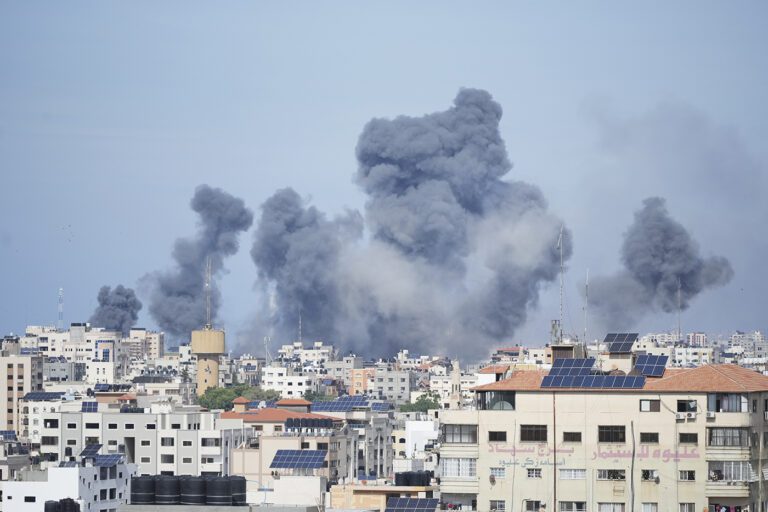This report is part of our ongoing coverage of the Israel-Hamas war. Visit our dedicated page for more on this topic.
An unprecedented surprise attack by Hamas in Israel in the early hours of Saturday during a major Jewish holiday may appear operationally successful, but “it will be a major strategic mistake for these Palestinian groups,” says the Northeastern University professor. Max Abrams.
“Israel's retaliation will be savage and extremely damaging to the Palestinian cause,” says Abrams, an associate professor of political science who specializes in the Middle East, international security and terrorism.
Reports on Sunday said at least 600 Israelis were killed and more than 2,000 wounded when Hamas militants fired thousands of rockets and sent dozens of fighters into Israeli towns near the Gaza Strip, taking hostages along the way.
“We've never seen an attack of this level of sophistication involving thousands of rockets,” not to mention the infiltration of fighters from boats and paragliders, Abrahms says.
Israel's response to the Hamas attack was swift, with Prime Minister Benjamin Netanyahu declaring the country at war and launching airstrikes in Gaza, where the Palestinian Health Ministry said on Sunday that nearly 370 Palestinians had been killed and 2,200 wounded.
A Hamas attack on Israel will have devastating consequences for Palestinian civilians, Abrams says.
“It will close the borders. Palestinians will not be able to work in Israel. They won't be able to support their families,” he says.
“Hamas will further impoverish the Palestinian people. Thousands of Palestinians will be unemployed. Israel is going to go into Gaza and create massive infrastructure damage.”
Israel's retaliation will be harsh and extremely damaging to the Palestinian cause.
Max Abrahms, associate professor of political science at Northeastern
And the carnage probably won't stop with Gaza and southern Israel, Abrams says.
“The war will probably spread. It will spread to the West Bank. And it could spread to Israel's northern border.”
A dangerous possibility is Hezbollah opening a northern front against Israel, Abrams says.
“Hezbollah is even more capable than Hamas and can do far more damage to Israel.”
Under these circumstances, Israel would conduct numerous sorties to protect the North, which could lead to “massive devastation” in southern Lebanon and Syria, Abrams says.
“It is likely that if things escalate, Israel will retaliate immediately and militarily against Iran,” he says. Abrams says Iran supports Hamas and is considered by the US and Israel to be the world's number one sponsor of terrorism.
“Iran is also on the verge of developing nuclear weapons. Israel is very concerned about this and has been for many years. It is not inconceivable that this war could extend to Israeli planes striking Iranian nuclear facilities.”
Americans with close ties to Israel closely monitor news coming from the country.
“It's a tragic situation”
“It's a tragic situation, terrifying,” he says Lori Lefkowitzdirector of the Jewish Studies Program at Northeastern.
“I have a lot of family in Israel,” he says. “We are concerned for the safety of our friends and families and our colleagues.”
Lefkovitz says her heart goes out to people who hear the sounds of sirens during the Jewish Sabbath and the usually joyous holy day of Simchat Torah, when Jews complete the annual cycle of Torah reading.
“Things are complicated in Israel,” he says. “Right now, it's not complicated. Right now it's just tragic and devastating. Israel is under attack.”
“Everyone will connect”
Simon Rabinowitzassociate professor of Jewish history at Northeastern, says Israel is a small country and all of its citizens will know that someone was injured, killed or went into battle because of the attacks that are still going on.
“Israel is geographically, naturally small. You have to think of it in the context of Boston being Tel Aviv and Cape Cod being Gaza,” he says.
“Everyone will be associated with a civilian who was killed or kidnapped in this horror. Everyone will be moved by the tragedy there,” says Rabinovitch, who has led Culture Dialogues in Israel.
A colleague at Brandeis University, where Rabinovitch received his doctorate, lost his daughter and son-in-law to Hamas attackers as they tried to protect their teenage son.
The Israelis expect a military response
Israelis are waiting to see what the extent of their country's military response will be and what the future holds for their sons and daughters in the armed forces and reserves, Rabinowitz says.
“This is still a tragedy happening right now,” he says. “It's still unfolding. We are at the beginning. Not the end.”
On the world stage, an attack by Palestinian militants could damage efforts to normalize relations between Israel and Saudi Arabia, but not necessarily, Abrahms says.
Saudi Arabia has said progress with the Palestinians is a prerequisite for stronger ties, he says.
“On the other hand, Saudi Arabia and Israel share the same adversary in Iran. Saudi Arabia, like Israel, has been hit by Iranian-backed terrorists. In the case of Saudi Arabia, it has been hit by terrorists from Yemen,” says Abrahms.
“If this becomes an open conflict between Israel and Iran, it could strengthen Saudi ties.”
Abrams says he doesn't see Israel asking the US for military support – unless the war widens to include direct conflict between Israel and Iran.
Cynthia McCormick Hibbert is a reporter for Northeastern Global News. Email her at c.hibbert@northeastern.edu or connect with her on X/Twitter @HibbertCynthia.



